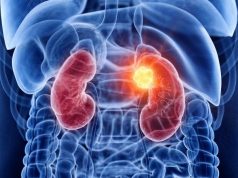ESR1 mutations prevalent in ER-positive metastatic breast cancer and linked to shorter survival
THURSDAY, Aug. 11, 2016 (HealthDay News) — For patients with estrogen receptor (ER)-positive metastatic breast cancer (MBC), estrogen receptor α (ESR1) mutations are prevalent and associated with shorter overall survival, according to a study published online Aug. 11 in JAMA Oncology.
Sarat Chandarlapaty, M.D., Ph.D., from the Memorial Sloan Kettering Cancer Center in New York City, and colleagues analyzed cell-free DNA from baseline plasma samples from participants in the BOLERO-2 double-blind phase 3 study that randomized women with MBC to exemestane plus placebo or exemestane plus everolimus. Baseline plasma samples were available for 541 patients. The authors examined the effect of mutation on overall survival and progression-free survival (PFS). The two most frequent mutations in ESR1 (Y537S and D538G) were analyzed using droplet digital polymerase chain reaction; samples were scored as wild type, Y537S, D538G, or double mutants.
The researchers found that 28.8 percent of patients had ESR1 mutations (21.1 percent D538G and/or 13.3 percent Y537S) and 30 patients had both mutations. These mutations correlated with shorter overall survival (wild type: 32.1 months; D538G: 25.99 months; Y537S: 19.98 months; both mutations: 15.15 months). The PFS benefit was similar for the D538G group and wild type with addition of everolimus to exemestane (hazard ratio, 0.34).
“ESR1 mutations are prevalent in ER-positive aromatase inhibitor-treated MBC,” the authors write. “Both Y537S and D538G mutations are associated with more aggressive disease biology.”
Several authors disclosed financial ties to Novartis, which funded the BOLERO-2 study and analysis performed in this work. One author disclosed ties to AstraZeneca.
Abstract
Full Text (subscription or payment may be required)
Editorial (subscription or payment may be required)
Copyright © 2016 HealthDay. All rights reserved.








